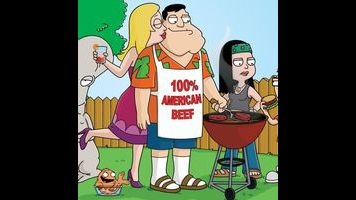Roger’s character transformations and lifestyle indulgences are a cornerstone of American Dad’s humor, and so is his blasé attitude about the consequences of his actions. He can become whomever he wants to be, whenever he wants to be, for whatever purpose he can think of, as long as the combination of disguise, mark, and ultimate goal get laughs. The Smith family has gone on with this for so long that at first I was surprised that suddenly, after Roger’s fraudulent Georgetown graduation with a master’s in archaeology, everyone but Francine shrugged off celebrating something Roger didn’t earn because it’s a sham.
Roger has a case full of trophies, and extras littered through the attic, but none of them for any kind of actual achievement—he simply purchased Cuba Gooding Jr.’s Oscar, an affront that Stan cannot abide, and the straw that breaks the camel’s back with regard to him tolerating Roger’s illegitimate accomplishments. Though Roger is capable of some impressive feats—including creating gross rainbows when he’s happy—he mostly enjoys the idea of an accolade through deception instead of an award as a symbol of effort and actual achievement. When Francine persuades him to actually work for something—Roger chooses running a marathon—I was firmly on Stan’s side, totally unwilling to believe Roger would choose to run, be able to run, or resist resorting to his typical ways.
Of course Roger betrays Francine’s trust, and after failing to run more than 100 yards in the marathon, he coerces Francine into driving him to the finish line, where he cheats his way to another trophy, just after she gives him her “Franny” medal for genuine effort. This deceit crushes Francine, and in turn makes Roger realize just how desperately he seeks her approval, so he jerks back to his faux archaeology degree and devises a plan to prove he can exert genuine effort to Francine.
But the eventual endpoint of this arc—that Francine realizes just how far Roger goes to put on a thorough and effective ruse—has been standard knowledge for years at this point. Sure, some of Roger’s disguises aren’t as well thought out as other characters, and the whole Indiana Jones shtick with a hired cast from a long-lost subterranean cave culture is a larger framework than typical American Dad episodes. But this whole mode of deception is Roger’s modus operandi. Francine and everyone else should know that already. I get that she’s trusting and gullible and goodhearted enough to want to believe Roger can and will change, but though I was laughing at how bold and overblown Roger’s setup became, Francine’s reactions are a bridge too far for me.
Elsewhere in the episode, Stan, as is often the case on American Dad, has trouble connecting with one of his children. Steve has a class assignment to interview his father in order to show that “history can come from anywhere,” but as is Stan’s typically standoffish desire with regard to his children, he’s not forthcoming in a face-to-face interview (or a face-to-back-of-newspaper interview). This is one of two basic Stan Smith paternal modes: he’s either hyper-meddling and inserting himself into the lives of his kids, or demonstrably removed and closed off, and this week is obviously the latter, as Stan bristles at “too personal” question about where he was born.
While studying together, Snot suggests that Steve simply call his father and get him talking on the phone. While it’s an interesting comedic premise, it’s too pat of a solution, a quick line between A and B without any searching or meandering. But this is the B-plot, so it can’t take too many steps. The twist that Stan is not only forthcoming in phone conversations, but uncomfortably detailed—when talking about killing for the CIA, having sex with Francine, and his own existential crises and suicidal thought—is funny, but what really works are Stan’s monologues. He deadpans his approach to killing in a way that reminded me of Ed O’Neill’s character from Wayne’s World, and the way Steve’s friends prevent him from stopping Stan when he talks about Francine is a nice little bit of adolescent humor.
There’s a fair amount to laugh at in this episode of American Dad, but not enough that works in either plot to justify how disparate the stories feel (or Jeff and Hayley’s absence). The Cuba Gooding Jr. runner pops up just enough times to remain funny without feeling like a crutch, and it links the two plots—if only through Stan’s violent defense of Gooding’s honor as an Oscar-winner.








































![Rob Reiner's son booked for murder amid homicide investigation [Updated]](https://img.pastemagazine.com/wp-content/avuploads/2025/12/15131025/MixCollage-15-Dec-2025-01-10-PM-9121.jpg)
